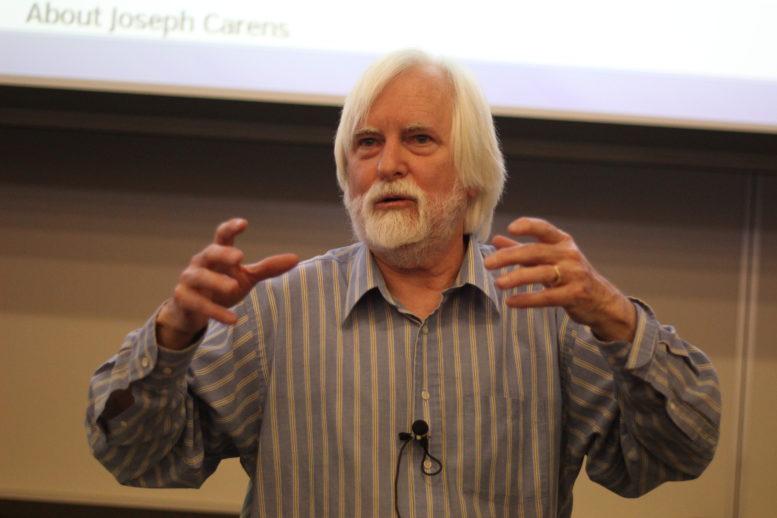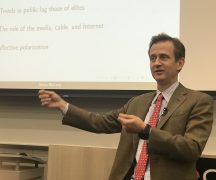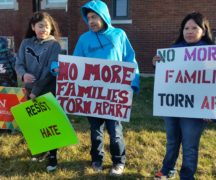By DAVID DUPONT
BG Independent News
While the president of the United States talks about building a wall to keep people out, political scientist Joseph Carens believes borders should be thrown open.
“We have to use overt force to prevent people from moving,” he said. “We need borders and barriers and guards to keep out people who want to build a decent life for themselves and their children. And that is something we can change. At least we can let more people in. Our refusal to do so is a choice we make, and one that prevents them from having a chance at a decent life.”
Carens, who spoke on “Immigration Controversies: Migrants, Refugees and Open Borders” Feb. 16 at Bowling Green State University bases his argument on the belief that “all human beings are equal” and have “equal moral worth.” His talk was hosted by the Philosophy, Politics, Economics and Law Program.
Yet, he said, the conventional view that states control who can come in and out means that the opportunities for human beings, especially those from impoverished and politically unstable states, are not equal.
“Freedom of movement is essential to the freedom of equal opportunity,” Carens said.
He sees no rationale for someone to be able to travel unhindered to Boston or Los Angeles, but then go through border checks to go to Toronto.
Any system of restrictions, he said, should take into account the interests of all parties involved including immigrants.
It is not enough to say an immigration regime that restricts who can come in and out and enforces that with guns, guards and barriers is valid simply because it benefits the people who currently reside within a state.
Carens equated the current approach to immigration to feudalism. In feudalism one’s ability to enrich oneself was based on birth, in that case whether one was born a noble or a peasant.
He conceded that the likelihood is slight that the conventional approach to immigration will change. But just as with feudalism or slavery, another institution accepted by many, it is important to question them, and point out that however entrenched and engrained they are in society they are not part of the natural order.
“I hope in a century future generations will look back at our time in bafflement or shock at how democratic states could have failed to see the deep injustice about a world so starkly divided between haves and have nots and were so complacent and did so little.”
Carens discussed open borders after considering how nations deal with refugees.
Even before the current Syrian crisis there were 11 million refugees, more than half of whom have been in refugee camps for more than five years. This does not include Palestinians refugees who are accounted for separately.
Carens said in handling refugees we should look back to the failure to accept German Jews in the 1930s. Many of the arguments against letting more Jews settle in the United States were the same as made now. They didn’t fit in. They weren’t Christian. Many had used bribes and false documents along the way. They may have included Nazi infiltrators or Communists.
“The response of democratic states to Jewish refugees in the 1930s was a profound moral failure that we should acknowledge and pledge never to repeat,” he said.
Any refugee policy should be looked through the lens of that crisis. If the policy would have kept Jews from fleeing the Nazis, then it is still a bad policy.
“It will give us a minimal standard, a fixed point,” he said.
In the wake of World War II, an international protocol for handling refugees was established. “Someone who arrives in a state must get a fair hearing about whether they are truly a refugee, and no one should be returned to a state where their basic rights are in danger of being violated.”
But that protocol is being undermined, Carens said, as nations require people from targeted countries to obtain a visa before they can even arrive and get that hearing.
“We have a moral responsibility to take in those who are refugees because of our actions,” Carens said. So the United States has a special responsibility to take in refugees uprooted by the conflicts in Iraq and Afghanistan, just as it did in the wake of the Vietnam War. “It is a deep moral failure that we haven’t done more.”
The United States took in hundreds of thousands refugees from Southeast Asian, some who in the case of some Afghanis and Iraqis, assisted the U.S. military. That resettlement effort was favored both by those who supported the war and those who opposed the war. It showed the United States could absorb a large number of people from a different culture.
This can only happen, he said, if they are not marginalized, isolated and stigmatized.
The United States and other rich nations also have a responsibility to take in refugees who are fleeing the consequences of climate change, he said. “Clearly the rich industrialized states bear a major responsibility for the changes that are already underway.”





